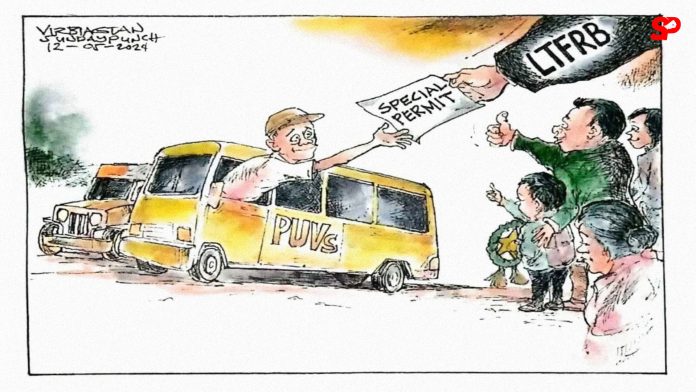Illustration by: Virgilio Biagtan
As the holiday season approaches, the Land Transportation Franchising and Regulatory Board’s (LTFRB) decision to issue special permits for public utility vehicles (PUVs) is a commendable and much-needed move. This action demonstrates a clear commitment to addressing the seasonal spike in commuter demand, ensuring smoother travel for Filipinos during one of the busiest times of the year.
The LTFRB’s proactive measure will allow additional PUVs to ply the roads from December 1, 2024, to January 7, 2025. This step aims to alleviate the perennial problem of overcrowding in terminals and limited transportation options, a scenario that often leads to delayed trips, inconvenienced passengers, and heightened holiday stress. By facilitating greater mobility, the LTFRB is responding directly to public needs, fostering a more comfortable and efficient travel experience for holiday-goers and daily commuters alike.
This move also supports the economy, as improved transportation translates to better access to businesses and markets during the peak shopping season. The seamless movement of goods and people is essential for small enterprises and consumers who rely on timely deliveries and in-person transactions. Moreover, by encouraging more regulated PUVs on the roads, the LTFRB helps mitigate the risks posed by illegal or unregistered transport operators who often exploit the high demand.
While this initiative deserves praise, its success hinges on strict implementation and coordination with local government units and enforcement agencies. Ensuring compliance with safety and operational standards is crucial to preventing overloading, reckless driving, and other risks that could jeopardize commuter safety.
This pro-people move by the LTFRB offers a glimmer of hope for more responsive governance, but it must not end here. A truly inclusive approach to transportation issues must also address the concerns surrounding the jeepney modernization program. To be genuinely pro-people, the program should be more inclusive, less impository, and conscious of the economic realities faced by simple jeepney drivers. Many drivers are in dire need of subsidies, financial support, and accessible mechanisms to transition to modernized vehicles without losing their livelihoods. Balancing modernization with compassion and support will pave the way for a more equitable and sustainable public transport system for all.

